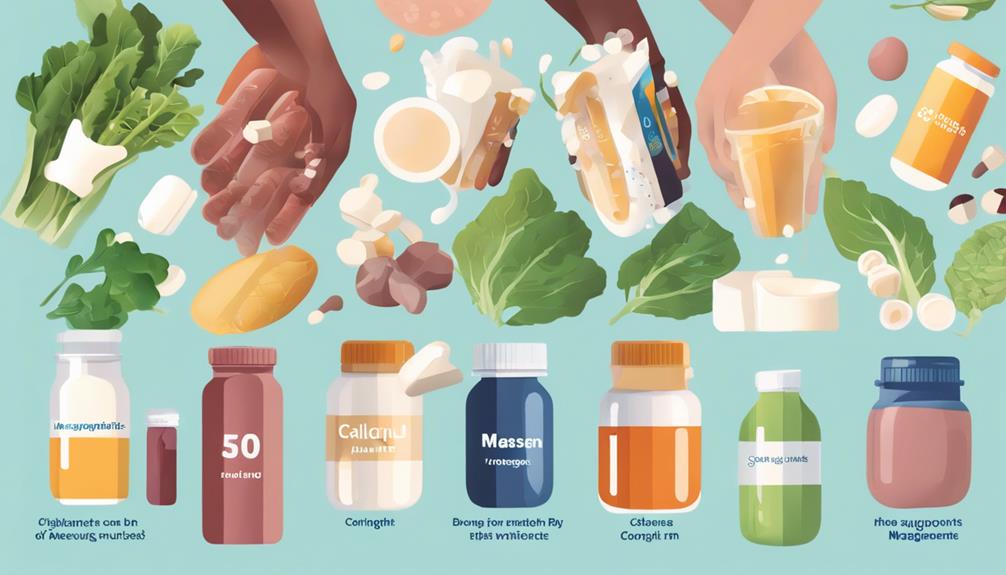The Best Supplements for Women to Support Bone Health
If you've ever wondered about the essential supplements to support your bone health, look no further. Imagine a scenario where a woman in her forties starts experiencing joint pain and is concerned about her bone density. She begins researching the best supplements to support bone strength and comes across a plethora of options like calcium, vitamin D, magnesium, and collagen. But which ones should she prioritize? Stay tuned to discover the most effective supplements tailored to women's bone health needs.
Calcium
When it comes to supporting your bone health as a woman, one of the essential supplements to consider is calcium. Calcium plays a crucial role in maintaining strong bones and preventing conditions like osteoporosis, especially as menopause effects can lead to accelerated bone density loss.
While dairy products are a common source of calcium, there are plenty of dairy alternatives for those who are lactose intolerant or follow a vegan diet. Incorporating foods like fortified plant-based milk, tofu, almonds, and leafy greens can help you meet your calcium needs.
During menopause, hormonal changes can impact calcium absorption and utilization in the body, making it even more important to ensure an adequate intake of this mineral. Supplements can also be a convenient way to boost your calcium levels, especially if dietary sources are limited.
Remember to consult with a healthcare provider to determine the right dosage for your individual needs and to discuss any potential interactions with other medications or supplements you may be taking. By prioritizing your calcium intake, you're taking a proactive step towards maintaining strong and healthy bones.
Vitamin D
To further fortify your bone health regimen, consider the significance of Vitamin D. Vitamin D plays a crucial role in bone health by aiding in the absorption of calcium and promoting optimal immune function. While sun exposure is a natural way for your body to produce Vitamin D, supplementation is often necessary, especially for those with limited sun exposure or darker skin tones.
| Vitamin D Sources | Benefits |
|---|---|
| Sun exposure | Natural production of Vitamin D |
| Supplementation | Ensures adequate Vitamin D levels |
Ensuring sufficient Vitamin D levels is essential for maintaining strong bones and supporting overall health. Vitamin D helps your body absorb calcium effectively, which is vital for bone density and strength. Additionally, Vitamin D plays a role in modulating the immune system, potentially reducing the risk of autoimmune diseases. By incorporating sources of Vitamin D into your routine, you can optimize your bone health and support your immune system.
Magnesium
A crucial mineral for bone health and overall well-being is magnesium. Magnesium deficiency can lead to symptoms such as muscle cramps, fatigue, and even osteoporosis. Ensuring an adequate intake of magnesium is essential for maintaining strong bones and overall health. Here are some tips to incorporate magnesium into your diet:
- Leafy Greens: Spinach and kale are excellent sources of magnesium.
- Nuts and Seeds: Almonds, pumpkin seeds, and sunflower seeds are rich in magnesium.
- Avocado: This creamy fruit isn't only delicious but also a good source of magnesium.
- Whole Grains: Brown rice, quinoa, and whole wheat pasta are great options for magnesium intake.
- Bananas: A tasty and convenient snack that provides a good amount of magnesium.
Incorporating these magnesium-rich foods into your meals can help support your bone health and overall well-being. Try adding them to salads, smoothies, or enjoying them as snacks to boost your magnesium intake.
Collagen
Collagen, a key protein in the body, plays a vital role in maintaining the structural integrity of various tissues, including bones, joints, and skin. When it comes to skin benefits, collagen is known for promoting elasticity and hydration, helping to reduce the appearance of wrinkles and improve skin firmness. As we age, our natural collagen production decreases, making supplementation beneficial for maintaining youthful skin.
In addition to skin benefits, collagen also provides essential joint support. Collagen helps maintain the integrity of cartilage, which is the rubber-like tissue that protects our joints. By supporting cartilage health, collagen supplements can aid in reducing joint pain and stiffness, promoting flexibility, and overall joint function.
Incorporating collagen supplements into your routine can be a great way to support both your skin and joint health. Whether you're looking to improve skin elasticity or alleviate joint discomfort, collagen may be a valuable addition to your daily supplement regimen.
Vitamin K
Collagen supplements aren't the only option for supporting bone health in women. When it comes to bone health, Vitamin K plays a crucial role. This vitamin helps in bone mineralization and supports bone density.
Here are some important points to consider:
- Food sources: Vitamin K can be found in various foods such as leafy greens (spinach, kale), broccoli, brussels sprouts, and fermented foods like natto.
- Absorption rates: Vitamin K absorption can be influenced by factors like the presence of dietary fats and the health of your gut microbiome.
- Adequate Vitamin K intake is essential for proper calcium absorption and utilization in bones.
- Vitamin K works synergistically with Vitamin D to maintain bone health.
- Consult with a healthcare provider to determine if you need a Vitamin K supplement, especially if you have a deficiency or specific health conditions affecting absorption.
Boron
When considering supplements for women to support bone health, boron emerges as a noteworthy mineral worth exploring. Boron benefits bone health by aiding in the metabolism of key minerals like calcium and magnesium, which are crucial for maintaining strong bones. Research suggests that boron plays a role in preventing bone loss and may even increase bone density, making it a valuable addition to a bone health regimen.
Recent boron research trends have highlighted its potential to enhance the absorption of calcium and magnesium, essential minerals for bone strength.
Studies have also shown that boron may help reduce inflammatory markers that contribute to bone density loss, promoting overall bone health.
Incorporating boron into your supplement routine could be beneficial for supporting your bone health. However, it's important to consult with a healthcare provider before adding any new supplement to your regimen to ensure it aligns with your individual health needs.
Strontium
Boron has shown promise in supporting bone health through its influence on mineral metabolism. Now, let's delve into Strontium, another essential mineral that can benefit your bones. Strontium has garnered attention for its positive impact on bone density and strength. Here are some key points to consider:
- Strontium benefits: Strontium can enhance bone formation and reduce bone resorption, leading to improved bone health.
- Recommended dosage: The typical recommended dosage for strontium is around 680mg per day, but it's crucial to consult with your healthcare provider for personalized advice.
- Strontium side effects: Some individuals may experience mild side effects such as gastrointestinal discomfort, but these are usually temporary.
- Contraindications: If you have kidney issues or are pregnant or breastfeeding, it's essential to avoid strontium supplementation due to potential risks.
When considering strontium supplementation, always prioritize professional guidance to ensure it aligns with your specific health needs.
Zinc
Curious about a mineral that plays a crucial role in supporting your bone health? Zinc is a vital nutrient that aids in the absorption of calcium, promoting bone strength and density. This essential mineral also contributes to maintaining hormone balance, which is crucial for overall bone health in women.
Zinc absorption is key to ensuring that your body can effectively utilize the calcium you consume through your diet or supplements. By supporting this process, zinc helps fortify your bones and reduces the risk of osteoporosis.
Moreover, zinc plays a significant role in hormone regulation, especially for estrogen and progesterone. These hormones are essential for bone formation and maintenance, making zinc an important factor in preserving bone density as you age.
To optimize your bone health, consider incorporating zinc-rich foods like oysters, beef, nuts, and seeds into your diet. If needed, supplements can also be beneficial, but consult with a healthcare provider to determine the right dosage for you.
Omega-3
Supporting your bone health involves more than just focusing on minerals like zinc. Omega-3 fatty acids play a crucial role in maintaining healthy bones and overall well-being. Omega-3 can be obtained from fish oil or plant sources and offers various benefits for your bone health.
Here are some key points about Omega-3 for supporting your bone health:
- Fish Oil: Omega-3 found in fish oil is essential for promoting bone density and strength, helping to reduce the risk of fractures and osteoporosis.
- Joint Health: Omega-3 fatty acids can also support joint health, reducing inflammation and improving mobility, which is crucial for overall bone health.
- Plant Sources: If you prefer plant-based options, sources like chia seeds, flaxseeds, and walnuts are rich in Omega-3 and can contribute to your bone health.
- Inflammation Control: Omega-3 helps control inflammation in the body, which can have a positive impact on bone health by reducing the risk of conditions that affect bone density.
- Overall Well-being: Incorporating Omega-3 into your diet can't only benefit your bones but also support your overall health and vitality.
Frequently Asked Questions
Can Supplements Replace a Balanced Diet for Bone Health?
Supplements can't replace a balanced diet for bone health. While they can enhance nutritional intake, they work best alongside a diverse diet. For optimal effectiveness, focus on dietary balance and use supplements as a complement, not a substitute.
Are There Any Interactions Between These Supplements and Medications?
You might experience potential risks with supplement-medication interactions. It's crucial to consult healthcare providers before combining them. Stay informed to safeguard your health. Protect yourself from unintended consequences by seeking professional guidance.
How Long Does It Take to See Results From These Supplements?
To see results in bone density, timing is crucial. Supplement effectiveness varies, but improvements may be noticed within 3-6 months. Consistent intake and lifestyle habits play a key role in achieving optimal bone health.
Can Men Also Benefit From These Bone Health Supplements?
As you ponder the benefits of bone health supplements, consider that while gender differences may exist, men can also benefit. Remember to follow dose recommendations for optimal results and consult a healthcare provider for personalized advice.
Are There Any Side Effects of Taking These Supplements Long-Term?
Long-term use of supplements may pose potential risks such as gastrointestinal discomfort, kidney issues, and nutrient imbalances. It's crucial to consult a healthcare provider for personalized guidance to minimize long-term effects on your health.
Conclusion
In conclusion, remember that "an ounce of prevention is worth a pound of cure." By incorporating essential supplements like calcium, vitamin D, magnesium, and collagen into your daily routine, you can take proactive steps to support your bone health and overall well-being. Don't wait until it's too late to start taking care of your bones – start today and give yourself the gift of strong and healthy bones for years to come.














